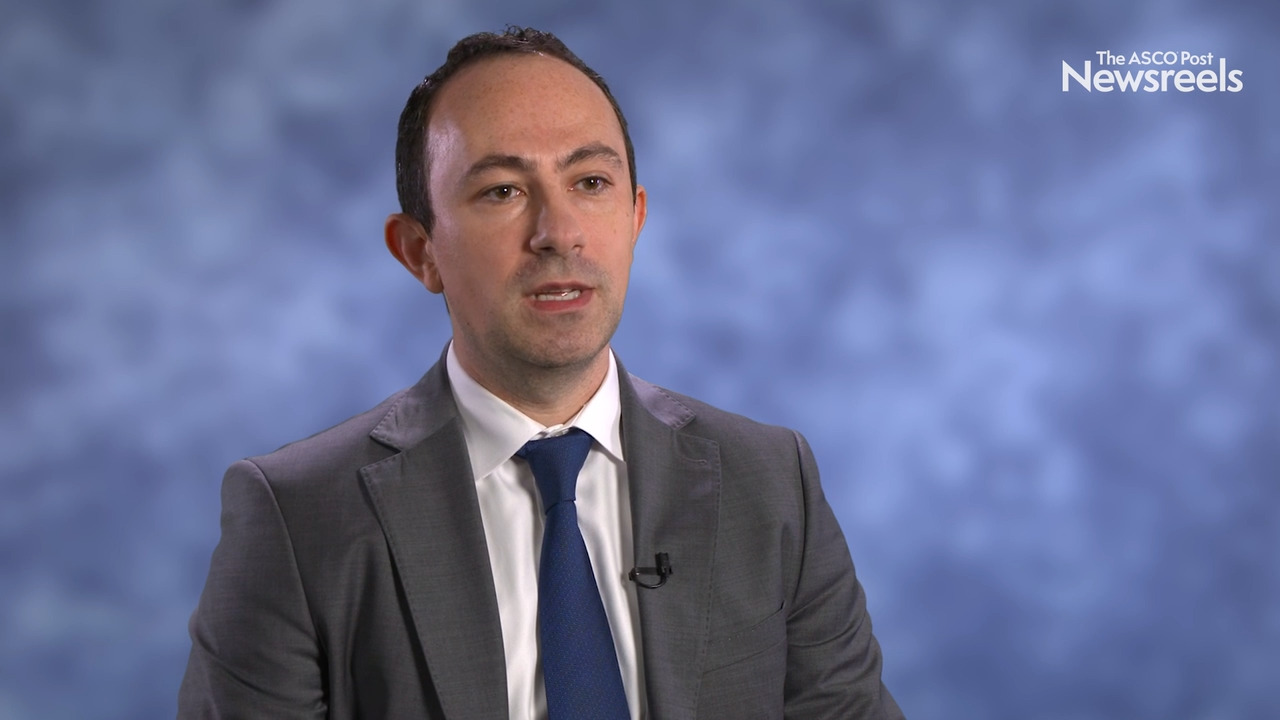2021 ASTRO Annual Meeting
De-escalation of Radiation Therapy for HPV-Positive, Intermediate-Risk Oropharyngeal Cancer
De-escalated adjuvant radiotherapy appears to be safe in patients with surgically resectable, human papillomavirus (HPV)--positive oropharyngeal cancers, particularly in patients without extranodal ex...
Shorter-Course Radiation Therapy: A New Practice Standard After Prostatectomy?
Hypofractionated radiotherapy to the prostate bed proved to be noninferior to conventionally fractionated radiotherapy after prostatectomy regarding gastrointestinal and genitourinary side effects, ac...
Can SBRT to Selected Sites of Limited Progression or Oligoprogression Extend Progression-Free Survival in Advanced Lung Cancer but Not Breast Cancer?
Stereotactic body radiation therapy (SBRT) lengthens progression-free survival for patients with advanced lung cancer who have oligoprogression (ie, tumors that have not been fully responsive to syste...
Accelerated Radiation Therapies Move Forward in Early Breast Cancer
Two studies reported at the 2021 American Society for Radiation Oncology (ASTRO) Annual Meeting provide evidence in support of the use of accelerated radiation therapies as safe alternatives to standa...
Shorter-Course Radiation Therapy: A New Practice Standard After Prostatectomy?
Hypofractionated radiotherapy to the prostate bed proved to be noninferior to conventionally fractionated radiotherapy after prostatectomy regarding gastrointestinal and genitourinary side effects, ac...
Yongbae Kim, MD, on Elective Internal Mammary Node Irradiation in Women With Node-Positive Breast Cancer: Results of a Randomized Phase III Trial
Yongbae Kim, MD, of the Yonsei Cancer Center and Yonsei University College of Medicine, discusses findings that showed the use of internal mammary area irradiation (IMNI) in regional nodal irradiation...
Use of Genomic Classifier Score May Help to Personalize Therapy for Men With High-Risk Prostate Cancer
A 22-genomic classifier (the Decipher score) was able to predict the course of disease in men with high-risk prostate cancer, according to a patient-level meta-analysis of three randomized clinical tr...
De-escalation of Radiation Therapy for HPV-Positive, Intermediate-Risk Oropharyngeal Cancer
De-escalated adjuvant radiotherapy appears to be safe in patients with surgically resectable, human papillomavirus (HPV)--positive oropharyngeal cancers, particularly in patients without extranodal ex...
No Survival Benefit but Improved Secondary Endpoints With Radiotherapy Plus Androgen Suppression in Intermediate-Risk Prostate Cancer
Both dose-escalated radiation therapy and short-course androgen-deprivation therapy have been shown to improve outcomes in intermediate-risk prostate cancer, but it is not clear whether giving both mo...
Howard M. Sandler, MD, on Prostate Cancer Highlights: An Expert Perspective
Howard M. Sandler, MD, of Cedars-Sinai Medical Center, discusses whether hypofractionation can be safely employed in the post-prostatectomy setting and the role of short-term hormone therapy in the ma...
Daniel F. Hayes, MD, on Liquid Biopsies to Detect and Monitor Oligometastases
Daniel F. Hayes, MD, of the University of Michigan Rogel Cancer Center, discusses whether liquid biopsies can provide insight into the challenge of curing metastatic breast and possibly other cancers,...
Shauna Campbell, DO, on Head and Neck Cancer: Toxicity Associated With Hypofractionated IMRT
Shauna Campbell, DO, of Cleveland Clinic, discusses results from her study that showed hypofractionated intensity-modulated radiation therapy (H-IMRT) in the definitive or postoperative treatment of h...
Erin Murphy, MD, on Low-Grade Glioma: Neurocognitive Function Following Treatment
Erin Murphy, MD, of Cleveland Clinic, discusses new data that show no apparent difference in cognitive performance up to 2 years post-treatment among adults with low-grade glioma who were treated with...
Amar U. Kishan, MD, on Prostate Cancer: Impact of Androgen-Deprivation Therapy With Radiotherapy
Amar U. Kishan, MD, of the University of California, Los Angeles, discusses findings from a meta-analysis of clinical trials in patients with localized prostate cancer. The phase III results suggest t...
Matthew Manning, MD, on Resolving Racial Disparities in the Treatment of Breast and Lung Cancers
Matthew Manning, MD, of Cone Health Cancer Center, discusses findings that showed changes to the way cancer care is delivered may help eliminate racial disparities in survival among patients with earl...
Karen M. Winkfield, MD, PhD, on Digital Health to Improve Patient Outcomes and Experience
Karen M. Winkfield, MD, PhD, of Vanderbilt University Medical Center, who co-chaired a session (PS 02) on digital health, summarizes the talks, which included ways to reduce disparities with digital i...
Mark K. Buyyounouski, MD, MS, on Prostate Cancer: Hypofractionated vs Conventional Radiotherapy After Surgery
Mark K. Buyyounouski, MD, MS, of Stanford University, discusses phase III results from the NRG Oncology GU003 trial, which showed that, post-prostatectomy, using fewer—but higher—doses of radiation do...
Benjamin Movsas, MD, on Prostate Cancer: Patient-Reported Outcomes on Radiotherapy and Androgen Suppression
Benjamin Movsas, MD, of the Henry Ford Cancer Center, discusses results from the NRG Oncology/RTOG 0815 study, which explored dose-escalated radiotherapy alone or in combination with short-term hormon...
Daniel J. Ma, MD, on HPV-Associated Oropharyngeal Squamous Cell Carcinoma: Comparing Longer and Shorter Courses of Radiotherapy
Daniel J. Ma, MD, of the Mayo Clinic Alix School of Medicine, discusses results from a phase III study of patients with HPV-associated oropharyngeal squamous cell carcinoma. Comparing a 2-week course ...
C. Jillian Tsai, MD, PhD, on Using Radiotherapy to Thwart Tumor Growth in Advanced Cancers
C. Jillian Tsai, MD, PhD, of Memorial Sloan Kettering Cancer Center, discusses results from the first randomized trial of stereotactic body radiation therapy (SBRT) to treat oligoprogressive, metastat...
Aadel A. Chaudhuri, MD, PhD, on Personalizing Treatment for Oligometastatic Cancer
Aadel A. Chaudhuri, MD, PhD, of Washington University School of Medicine in St. Louis, discusses circulating tumor DNA, which has the potential to better personalize treatment for patients with oligom...
Hypofractionated Postoperative Prostate Bed Radiotherapy Does Not Increase Patient-Reported Toxicity for Men With Prostate Cancer
A primary endpoint analysis of the NRG Oncology phase III NRG-GU003 clinical trial, which compared hypofractionated postoperative prostate bed radiotherapy (HYPORT) to conventional postprostatectomy r...
Youssef Zeidan, MD, PhD, on HER2-Positive Breast Cancer: Treatment-Related Cardiotoxicity
Youssef Zeidan, MD, PhD, of Florida International University and the Lynn Cancer Institute, discusses the advances in radiotherapy planning and delivery that have reduced cardiac radiation exposure in...
David A. Palma, MD, PhD, on HPV-Associated Oropharyngeal Squamous Cell Carcinoma: Radiotherapy vs Surgery
David A. Palma, MD, PhD, of Ontario’s London Health Sciences Centre, discusses results of the ORATOR2 study, which compared two treatment options that could be de-escalated for patients with HPV-assoc...
Phase III Trial Evaluates Efficacy of Total Androgen Suppression Plus Dose-Escalated Radiotherapy for Patients With Intermediate-Risk Prostate Cancer
Both dose-escalated radiation therapy and short-course androgen-deprivation therapy (SADT) have been shown to improve outcomes in patients with intermediate-risk prostate cancer. Researchers then pose...
Study Examines Use of External-Beam Radiotherapy as a Bridging Therapy for Patients With HCC Awaiting Transplant
Patients with hepatocellular carcinoma (HCC) awaiting liver transplantation may benefit from noninvasive treatment with external-beam radiotherapy (EBRT) but are rarely given this therapy, according t...
Diana D. Shi, MD, on IDH-Mutant Gliomas: De Novo Pyrmidine Synthesis Inhibitor Under Study
Diana D. Shi, MD, of Dana-Farber Cancer Institute and Brigham and Women’s Cancer Center, discusses studies being planned and already underway to test BAY 2402234, a de novo pyrimidine synthesis inhibi...
Robert A. Olson, MD, on Oligometastases: New Data on Stereotactic Ablative Radiotherapy
Robert A. Olson, MD, of the University of British Columbia, discusses phase II findings from the SABR-5 trial on stereotactic ablative radiotherapy for up to five oligometastases. Although toxicity of...
Study Finds Prior Authorization Costs Academic Radiation Oncology Clinics More Than $40 Million Every Year
The time required to secure prior authorization approvals for radiation therapy equates to a financial impact of more than $40 million annually for academic medical centers, according to a new study p...
ACCURE Trial Aims to Eliminate Disparities in Survival in Black and White Patients With Early-Stage Lung and Breast Cancers
A study presented by Manning et al at the 2021 American Society for Radiation Oncology (ASTRO) Annual Meeting (Abstract 53) showed that interventions to help Black patients overcome obstacles to compl...
22-Gene Classifier Score May Allow for Personalization of Therapy in Patients With High-Risk Prostate Cancer
A 22-gene genomic classifier (the Decipher score) may be able to predict the course of disease in men with high-risk prostate cancer, according to a patient-level meta-analysis of three randomized cli...

















